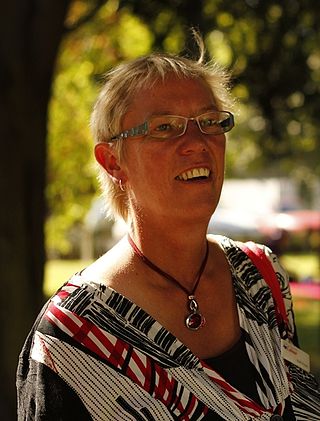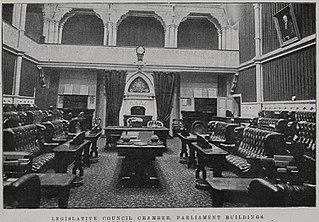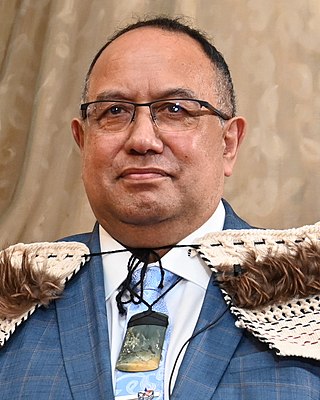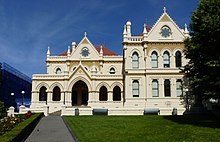
The politics of New Zealand function within a framework of a unitary parliamentary representative democracy. The structure of government is based on the Westminster system, and the legal system is modelled on the common law of England. New Zealand is a constitutional monarchy, in which King Charles III is the sovereign and head of state.

The Victoria University of Wellington is a public university in Wellington, New Zealand. It was established in 1897 by Act of Parliament, and was a constituent college of the University of New Zealand.

The prime minister of New Zealand is the head of government of New Zealand. The incumbent prime minister, Chris Hipkins, leader of the New Zealand Labour Party, took office on 25 January 2023.

The New Zealand Parliament is the unicameral legislature of New Zealand, consisting of the King of New Zealand (King-in-Parliament) and the New Zealand House of Representatives. The King is usually represented by his governor-general. Before 1951, there was an upper chamber, the New Zealand Legislative Council. The New Zealand Parliament was established in 1854 and is one of the oldest continuously functioning legislatures in the world. It has met in Wellington, the capital of New Zealand, since 1865.

The House of Representatives is the sole chamber of the New Zealand Parliament. The House passes laws, provides ministers to form Cabinet, and supervises the work of government. It is also responsible for adopting the state's budgets and approving the state's accounts.

In New Zealand, the speaker of the House of Representatives, commonly known as the speaker of the House, is the presiding officer and highest authority of the New Zealand House of Representatives. The individual who holds the position is elected by members of the House from among their number in the first session after each general election. They hold one of the highest-ranking offices in New Zealand. The current Speaker is Adrian Rurawhe who was elected on 24 August 2022.

Jonathan Lucas Hunt is a New Zealand politician, and was New Zealand's High Commissioner to the United Kingdom from 2005 to March 2008. He formerly served as Speaker of the New Zealand House of Representatives. He is a member of the Labour Party, and was until his retirement in 2005 the longest-serving MP in Parliament. Hunt is a member of the Order of New Zealand, New Zealand's highest civilian honour. Hunt was given the nickname the "Minister for Wine and Cheese" after his well-known liking of the combo.

Trevor Colin Mallard is a New Zealand politician. He currently serves as Ambassador of New Zealand to Ireland since 2023. He was a Member of Parliament from 1984 to 1990 and again from 1993 to 2022. He served as Speaker of the New Zealand House of Representatives from 2017 until 2022.

Derek Francis Quigley is a New Zealand former politician. He was a prominent member of the National Party during the late 1970s and early 1980s, and was known for his support of free market economics and trade liberalisation. Quigley left the National Party after clashing with its leadership, and later co-founded the ACT New Zealand party.

Ruth Suzanne Dyson is a former New Zealand politician. She was a Labour Party Member of Parliament from 1993 to 2020. She represented the Port Hills electorate from the 2008 election election to 2020. She also held a number of senior offices in the Labour Party, including president.

The New Zealand Legislative Council was the upper house of the General Assembly of New Zealand between 1853 and 1951. An earlier arrangement of legislative councils for the colony and provinces existed from 1841 when New Zealand became a colony; it was reconstituted as the upper house of a bicameral legislature when New Zealand became self-governing in 1852, which came into effect in the following year.

New Zealand Parliament Buildings house the New Zealand Parliament and are on a 45,000 square metre site at the northern end of Lambton Quay, Wellington. They consist of the Edwardian neoclassical-style Parliament House (1922); the Parliamentary Library (1899); the executive wing, called "The Beehive" (1977); and Bowen House, in use since 1991. Whilst most of the individual buildings are outstanding for different reasons, the overall setting that has been achieved "has little aesthetic or architectural coherence".

The New Zealand Government is the central government through which political authority is exercised in New Zealand. As in most other parliamentary democracies, the term "Government" refers chiefly to the executive branch, and more specifically to the collective ministry directing the executive. Based on the principle of responsible government, it operates within the framework that "the [King] reigns, but the government rules, so long as it has the support of the House of Representatives". The Cabinet Manual describes the main laws, rules and conventions affecting the conduct and operation of the Government.

Wellington Central is an electorate, represented by a Member of Parliament in the New Zealand House of Representatives. Its MP since November 2008 has been Labour Party's Grant Robertson. In the 2020 election he was opposed by James Shaw (Greens) and Nicola Willis (National), both also entered parliament via their respective party lists.

New Zealand has a unitary system of government in which the authority of the central government defines sub-national entities. Local government in New Zealand has only the powers conferred upon it by the New Zealand Parliament. In general, local authorities are responsible for enabling democratic local decision-making and promoting the social, economic, environmental, and cultural well-being of their communities, as well as more specific functions for which they have delegated authority.

Melissa Heni Mekameka Whaitiri is a New Zealand politician and member of the New Zealand House of Representatives. She was first elected to Parliament in the 2013 Ikaroa-Rāwhiti by-election for the Labour Party.

Adrian Paki Rurawhe is a New Zealand Labour Party politician of Ngāti Apa descent. He is the speaker of the New Zealand House of Representatives, the second Māori to hold the position, and Member of Parliament for Te Tai Hauāuru.

The Minister of Immigration was established in 1872 as the Secretary for Crown Lands and Immigration. The minister appointed was William Fitzherbert but when replaced later in the year by Maurice O'Rorke, the title was changed to Minister of Immigration.

The 52nd New Zealand Parliament was a meeting of the legislature in New Zealand, which opened on 7 November 2017 following the 2017 general election and dissolved on 6 September 2020. The New Zealand Parliament comprises the Sovereign and the House of Representatives, which consists of 120 members.

The 53rd New Zealand Parliament is the current meeting of Parliament in New Zealand. It opened on 25 November 2020 following the 17 October 2020 general election, and will expire on or before 20 November 2023 to trigger the next election. It consists of 120 members of Parliament (MPs) with five parties represented: the Labour and Green parties, in government, and the National, Māori and ACT parties, in opposition. The Sixth Labour Government has a majority in this Parliament. Jacinda Ardern continued as prime minister until her resignation on 25 January 2023; she was succeeded by Chris Hipkins.
















